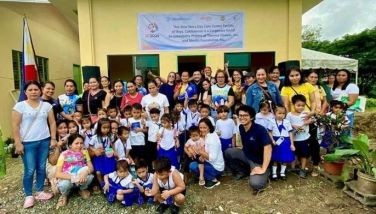Join national ecosavers program, DENR tells students
MANILA, Philippines - Environment and Natural Resources Secretary Ramon Paje announced that they will enjoin students to collect and segregate recyclable materials from their respective households and bring them to school where these are collected and later brought to recyclers.
Paje said they are encouraged to bring biodegradable materials which will be turned into compost soil that can be used as medium in producing tree seedlings for planting under the National Greening Program.
“We could just imagine if all the 1.99 million students would be able to bring in at least half a kilo of recyclable garbage everyday, the impact would be great not only in terms of reducing the stress on the collection and disposal system, but also in addressing the littering problem that causes the clogging of esteros and storm drainage,” he explained.
Paje has committed a P50 million funding for the project which will be implemented initially in Metro Manila where garbage generation stands at 8,000 tons per day. Of this total, half comprises of food and other organics, a fourth composed of plastic materials, while 12 percent is paper. The remaining balance consisted of metals (5 percent), glass (3 percent), special and hazardous waste (1 percent) and residuals (4 percent).
This National Ecosavers Program or NEP will be implemented under a convergence approach involving the DENR, the Department of Interior and Local Government (DILG), Department of Education (DepEd) and Metropolitan Manila Development Authority (MMDA). The agencies entered into a memorandum of agreement recently with non-government organization Galing Pook Foundation, Inc. (GPF) concerning program implementation.
Paje disclosed that an incentive mechanism is still being formulated following a credit system approach using an “Ecosavers Club Passbook” issued to students which will record the credit points a student earns.
Among the options being studied include credit points that can be exchanged for basic commodities or peso equivalent that will be deposited in a student’s own savings bank account.
“The program will teach students in the most practical and understandable way of how the garbage can be converted into a valuable resource. It will show them that indeed, may pera sa basura,” Paje added.
- Latest
























